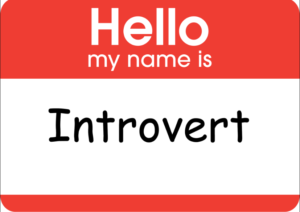When you first think of a social engineer a vision of a charming, socialite type of person may come to mind. One who can influence and talk to anyone with very little effort. That does sound like a very effective SE, no question there. Is there a place for an introverted social engineer though?

The Typical Introvert
One difference between an extrovert and an introvert is the amount of external stimulation each can endure before becoming overwhelmed. In the book “Quiet: The Power of Introverts in a World That Can’t Stop Talking,” the author talks about that relationship and how it is not set in stone, per se, but just a natural tendency for the individual. Many introverts tend to be in their heads more than their extroverted counterparts. This is easily seen in social settings where some are “social butterflies,” moving and talking and interacting with everyone they can, while others are sitting in a corner observing the world, where interactions are more one-on-one rather than talking to a group all at the same time.
So, to tie this back to social engineering, the extrovert may seem to be a more natural fit for the job. Unfortunately, that mindset tends to exclude a large section of the population that is very capable and productive in this field. Just because it takes more effort to do the job does not mean it is not possible and rewarding. In fact, it can even be the catalyst to significant personal growth. Gaining skills to interact while working as a professional social engineer is easily transferrable to one’s personal life.
What It Really Takes to Make it as a Social Engineer
The most beneficial skill to have is the ability to approach, engage, and persist in uncomfortable situations. Whether you are a long-time practitioner or just starting out, there will be situations where things get awkward and how you react to that will determine success or failure at the task you are performing.
Just because someone’s natural tendency may to shy away from awkward situations does not mean they are incapable of staying in the moment. All it takes is the desire to perform well and the knowledge that it won’t last forever, and anyone can deal with a situation in this context. An introvert may need more time to process the events, before or after it is over, than an extrovert, but that should not be a road block to performing what can be not only an exciting job, but a fulfilling and satisfying job in the information security field.
Adaptability, knowing the goals, and having a couple plans to get there, all fall into the wheel house of many introverts. That is why the scariest part of attempting this type of job is the first step: engaging with someone. After that, all the wonderful qualities of that personality type can flourish and grow. The industry that consists of both personality types is stronger and well representative of the world as a whole. This author knows there is so much opportunity for introverted social engineers, they just have to try.
Sources:
https://www.amazon.com/gp/search?index=books&linkCode=qs&keywords=9780307352156
https://www.youtube.com/watch?v=CHv3HwVMRg8
Image: https://www.krtmarketing.com/blog/introverts-workplace/
1 Comment
Comments are closed.


Thanks for the information on what it takes to become a social engineer. The concept is quite frightening and fascinating at the same time! Mind sharing more information on our blog?